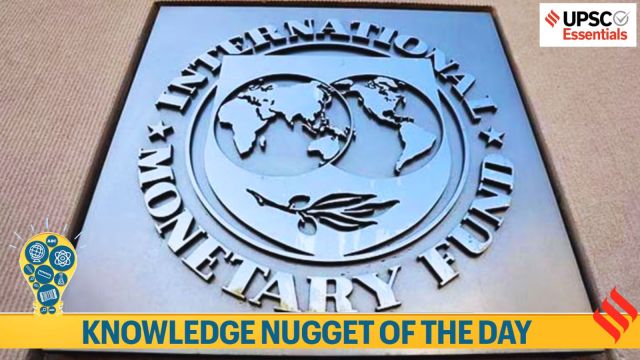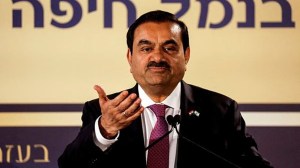Knowledge Nugget: Why IMF, its Bailouts, and Extended Fund Facility (EFF) should be in focus for your UPSC Exam
With the IMF recently clearing a loan tranche for Pakistan, the organization has been in the headlines. But how can you connect the dots between this current affair and the static portion of the UPSC syllabus? Take a look.
 India opposed the frequent bailouts to Pakistan in the IMF board meeting. (Photo: Reuters)
India opposed the frequent bailouts to Pakistan in the IMF board meeting. (Photo: Reuters)Take a look at the essential events, concepts, terms, quotes, or phenomena every day and brush up your knowledge. Here’s your knowledge nugget for today on International Monetary Fund (IMF) and its various facilities.
Knowledge Nugget: IMF, IMF bailouts and Extended Fund Facility (EFF)
Subject: International Organisations
(Relevance: International organisations, especially the IMF, form a crucial part of the UPSC CSE syllabus, as previously various questions have been asked with regard to the IMF and its facilities and reports. Thus, knowing about this organisation and associated aspects becomes important.)
Why in the news?
The International Monetary Fund (IMF) cleared a $1-billion tranche for Pakistan as part of its $7-billion Extended Fund Facility (EFF) lending program and $1.3 billion tranche under the Resilience and Sustainability Facility (RSF) in its board meeting held Friday.
India abstained from voting in the meeting as it raised concerns over the efficacy of IMF programmes for Pakistan given its “poor track record” and also on the possibility of “misuse of debt financing funds for state-sponsored cross-border terrorism”, an official release by the Ministry of Finance, Government of India, said. In this context, let’s know about the IMF from a broader perspective.
Key Takeaways :
1. Set up in 1945 , the International Monetary Fund (IMF) works to achieve sustainable growth and prosperity for all of its 191 member countries. It does so by supporting economic policies that promote financial stability and monetary cooperation, which are essential to increase productivity, job creation, and economic well-being.
2. It has three critical missions:
(i) Furthering international monetary cooperation,
(ii) Encouraging the expansion of trade and economic growth, and
(iii) Discouraging policies that would harm prosperity.
2. According to official website of IMF, “Unlike development banks, the IMF does not lend for specific projects. Instead, the IMF provides financial support to countries hit by crises to create breathing room as they implement policies that restore economic stability and growth. It also provides precautionary financing to help prevent crises.”
📍Board of Governors
1. It is the highest decision-making body of the IMF. It normally meets once a year.
2. It consists of one governor and one alternate governor for each member country. The governor is appointed by the member country and is usually the minister of finance or the governor of the central bank.
2. All powers of the IMF are vested in the Board of Governors. The Board of Governors may delegate to the Executive Board all except certain reserved powers.
| Where does IMF get its money? |
| IMF funds come from three sources: member quotas, multilateral and bilateral borrowing agreements. Quotas are the IMF’s main source of financing, wherein each member of the IMF is assigned a quota, based broadly on its relative position in the world economy. |
📍Executive Board
1. As per the IMF, the Executive Board is responsible for conducting the day-to-day business of the IMF.
2. It is composed of 25 Directors, who are elected by member countries or by groups of countries, and the Managing Director, who serves as its Chairman.
3. The Board usually meets several times each week. It carries out its work largely on the basis of papers prepared by IMF management and staff.
| Who is the Managing Director of IMF? |
| Kristalina Georgieva has been serving as Managing Director of the International Monetary Fund since October 1, 2019. She began her second term on October 1, 2024. |
What are IMF bailouts?
1. In a general sense, a bailout means extending support to an entity facing a threat of bankruptcy. Countries seek IMF bailouts when they are facing macroeconomic risks, currency crises and need assistance to meet external debt obligations, to buy essential imports and push the exchange value of their currencies.
2. According to the IMF website, inappropriate fiscal and monetary policies, which can lead to large current account and fiscal deficits and high public debt levels; an exchange rate fixed at an inappropriate level, which can erode competitiveness and result in the loss of official reserves, and a weak financial system, which can create economic booms and busts are among factors that lead to economic crises. Political instability and weak institutions also can trigger crises, as can insolvent financial institutions.
3. The IMF lends money to the economies in peril in the form of Special Drawing Rights (SDRs), which is a basket of five currencies — US dollar, Euro, Chinese Yuan, Japanese Yen and British Pound. It can be executed in the form of loans, cash, bonds, or stock purchases.
4. The lending is done through programs designed according to purpose. According to the IMF, these include standby arrangement, standby credit facility, extended fund facility, extended credit facility, rapid financing instrument, rapid credit facility, flexible credit line, short term liquidity line, precaution and liquidity line, resilience and sustainability facility, staff monitored program, policy support instrument and policy coordination instrument.
📍What are the conditions applicable to an IMF bailout?
1. Among the conditions laid down for a country seeking financial assistance from the IMF could be certain structural reforms, such as fiscal transparency, tax reforms and reforms in state-owned enterprises.
2. Conditions for IMF lending also relate to macroeconomic variables, like monetary and credit aggregates, international reserves, fiscal balances, and external borrowing, as per the IMF.
What is Extended Fund Facility (EFF)?
1. An EFF is a financial assistance package offered by the IMF to countries facing serious medium-term balance of payments problems because of structural weaknesses that require time to address.
2. Notably, the assistance under the EFF is in the form of a loan that has to be paid back, and not in the form of a grant or aid. The IMF states: “To help countries implement medium-term structural reforms, the EFF offers longer program engagement and a longer repayment period.”
3. The term “extended” means that these countries need more time than usual to pay back the money because they need to bring about “structural” changes.
BEYOND THE NUGGET: Reports Published by the IMF
📍World Economic Outlook
1. The IMF releases the World Economic Outlook twice every year, in April and October, apart from updating it twice — in January and July.
2. In the recently released IMF World Economic Outlook April 2025, the global growth forecast has been marked downwards by 0.5 percentage points to 2.8 per cent for 2025 and by 0.3 percentage points to 3 per cent for 2026 compared to this year’s January edition.
3. Presently positioned as the fourth-largest economy globally, on par with Japan, the IMF forecasts India to be the fastest-growing major economy over the next two years, maintaining a significant advantage over both global and regional competitors despite the adjustment in growth projections.
📍Global Financial Stability Report
1. The Global Financial Stability Report provides an assessment of the global financial system and markets, and addresses emerging market financing in a global context.
2. It focuses on current market conditions, highlighting systemic issues that could pose a risk to financial stability and sustained market access by emerging market borrowers. It draws out the financial ramifications of economic imbalances highlighted by the IMF’s World Economic Outlook.
Post Read Questions
(1) “Rapid Financing Instrument” and “Rapid Credit Facility” are related to the provisions of lending by which one of the following? (UPSC CSE 2022)
(a) Asian Development Bank
(b) International Monetary Fund
(c) United Nations Environment Programme Finance Initiative
(d) World Bank
(2) ‘Global Financial Stability Report’ is prepared by the (UPSC CSE 2016)
(a) European Central Bank
(b) International Monetary Fund
(c) International Bank for Reconstruction and Development
(d) Organization for Economic Cooperation and Development
| Answer key |
| 1. (b) 2. (b) |
(Sources: imf.org, IMF clears loan tranche to Pakistan; India abstains from vote, registers ‘strong dissent’,What is an IMF bailout and what are the lending conditions?)
Subscribe to our UPSC newsletter. Stay updated with the latest UPSC articles by joining our Telegram channel – Indian Express UPSC Hub, and follow us on Instagram and X.
🚨 Click Here to read the UPSC Essentials magazine for April 2025. Share your views and suggestions in the comment box or at Manas Srivastava 🚨
Must Read
Buzzing Now


Jun 02: Latest News
- 01
- 02
- 03
- 04
- 05

























